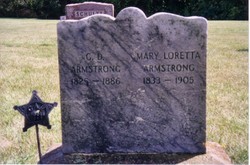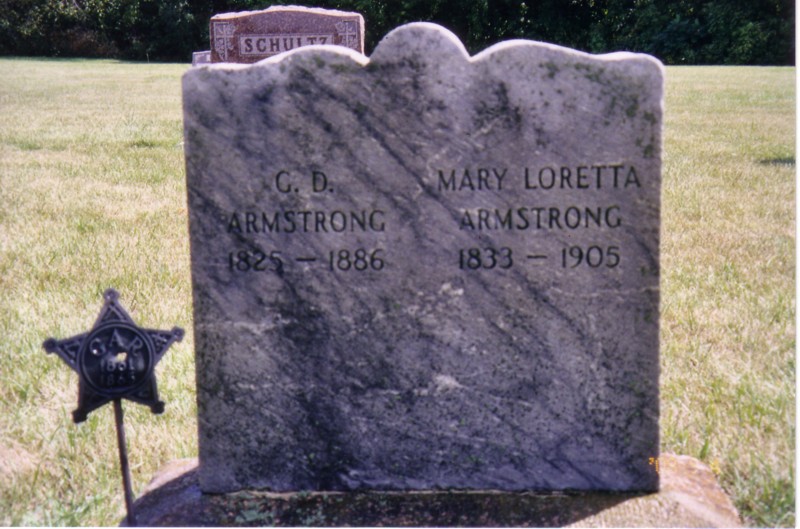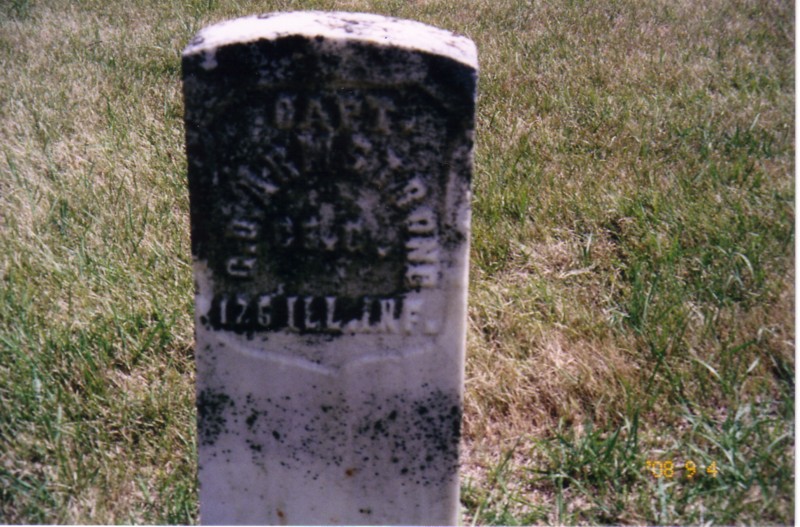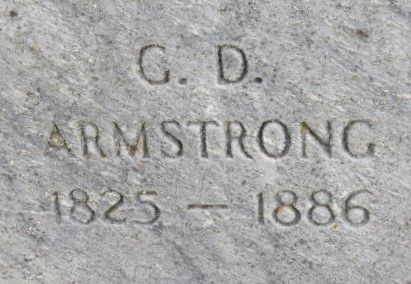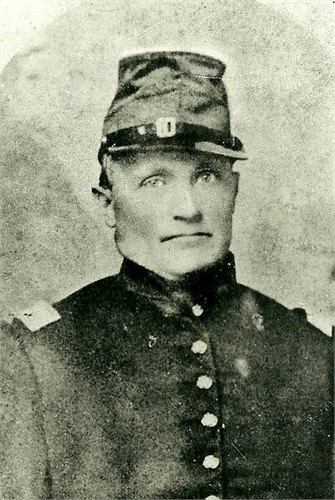April 27, 2011
BICKER: Family links to Civil War
By Angie Bicker
Lifestyle Editor
CLINTON — On Aug. 9, 1862, a light haired, 5-8 ½" blue-eyed 37-year-old farmer decided to fight alongside Union troops in the Civil War, leaving his wife and children behind. This man, Gabriel Dusenbury Armstrong, was my great-great-great-grandfather. Gabriel was one of many Union soldiers who took to battlefields far away from home in the fight to end slavery. His brother-in-law, Eugene Bigelow, also joined the Army on the same day.
Gabriel was born Oct. 25, 1825, in Cohocton, Steuben County, New York, to Nathan Martin and Polly Dusenbury Armstrong. At 25, he married Mary Loretta Bigelow, on May 5, 1850, in Rock Island County in Rock Island, Ill. On a recent trip to the Rock Island Historical Society in Moline, Ill., I found them listed in a book of marriage licenses. They were the 613th couple married in the county at that time. When Gabriel departed for the Civil War, he and his wife had two sons, Xenia Ernest and Leonard Lord. A third son, Gabriel Lord, who is the direct branch in my family tree, was born just after his father went off to war. Little Gabriel finally met his father when he was about 3 years old.
The 126th Illinois Infantry volunteers was organized in Alton, Ill., by Col. Jonathan Richmond and mustered in Sept. 4, 1862. Lieutenant colonels included Ezra M. Beardsley and Lucius W. Beal and Majs. William W. Wilshire and John Morris. According to regimental history found on Ancestry.com, the 126th Illinois volunteers moved on Nov. 20, 1862, to Columbus, Ky., and then to Bolivar, Tenn. The men served in Tennessee until July 24, 1863, when they embarked for Helena, Ark., and marched with Gen. Steele's Army participating in the capture of Little Rock, Ark., on Sept. 10. The remainder of their service was spent in Arkansas and they were mustered out at Pine Bluff, Ark., on June 4 and July 12, 1865. Gabriel was promoted several times. According to family records, he was apparently a born leader since all of his promotions were incurred on the battlefield. He was promoted to full first lieutenant on Jan. 4, 1864, and full captain on March 13, 1865. According to copies of his military records, at age 39 he was promoted to captain by the governor of Illinois to fill the vacancy caused by the discharge of Capt. William H. Schriver. He held that rank until he was honorably discharged on July 12, 1865. While on duty at the mouth of the White River in Arkansas, he contracted rheumatism from which he never recovered.
When I recently visited with relatives, Beth and Matthew Armstrong, of Erie, Ill., I also found out that Gabriel's regiment was also part of the Siege of Vicksburg, which was from May 18 to July 4, 1863. I was absolutely stunned by this revelation. While we were surfing the Internet, we found the Vicksburg National Military Park website, which listed Union forces involved with the battle. Gabriel's 126th Illinois Infantry was listed under the Provisional Division. I can't even fathom the horrors of war that were seen through his blue eyes. It is even more amazing to me that after three years in the Civil War, he came home to his family. There is a monument dedicated to the troops of the 126th Illinois Infantry at Vicksburg National Military Park. President Lincoln once said early during the Civil War, "See what a lot of land these fellows hold, of which Vicksburg is the key, the war can never be brought to a close until that key is in our pocket." It's amazing to think, that 150 years ago, my great-great-great-grandfather was an important element in this victory.
When Gabriel returned home, he and his wife had three more children, James, Lucy and Elmira. He lived in Rock Island County, then Richmond County, Wisconsin, and finally Winneshiek County in Iowa. According to family records, Gabriel worked on the railroad after he returned from the war. I also located census records from Winneshiek County that listed Gabriel as a farmer toward the end of his life. He and his family made their final home together in Ridgeway. He applied for a declaration for an original invalid pension on Sept. 19, 1884, in Ridgeway. He died Nov. 1, 1886, at the age of 61 and is laid to rest in the local cemetery. As I researched Gabriel's life the last couple of weeks, I have truly been in awe of this man who rose through the ranks during the Civil War and had a fighting spirit to survive. His story is definitely one of courage and bravery. Each of us has a story and I'm grateful I had the keys to unlock mine.
April 27, 2011
BICKER: Family links to Civil War
By Angie Bicker
Lifestyle Editor
CLINTON — On Aug. 9, 1862, a light haired, 5-8 ½" blue-eyed 37-year-old farmer decided to fight alongside Union troops in the Civil War, leaving his wife and children behind. This man, Gabriel Dusenbury Armstrong, was my great-great-great-grandfather. Gabriel was one of many Union soldiers who took to battlefields far away from home in the fight to end slavery. His brother-in-law, Eugene Bigelow, also joined the Army on the same day.
Gabriel was born Oct. 25, 1825, in Cohocton, Steuben County, New York, to Nathan Martin and Polly Dusenbury Armstrong. At 25, he married Mary Loretta Bigelow, on May 5, 1850, in Rock Island County in Rock Island, Ill. On a recent trip to the Rock Island Historical Society in Moline, Ill., I found them listed in a book of marriage licenses. They were the 613th couple married in the county at that time. When Gabriel departed for the Civil War, he and his wife had two sons, Xenia Ernest and Leonard Lord. A third son, Gabriel Lord, who is the direct branch in my family tree, was born just after his father went off to war. Little Gabriel finally met his father when he was about 3 years old.
The 126th Illinois Infantry volunteers was organized in Alton, Ill., by Col. Jonathan Richmond and mustered in Sept. 4, 1862. Lieutenant colonels included Ezra M. Beardsley and Lucius W. Beal and Majs. William W. Wilshire and John Morris. According to regimental history found on Ancestry.com, the 126th Illinois volunteers moved on Nov. 20, 1862, to Columbus, Ky., and then to Bolivar, Tenn. The men served in Tennessee until July 24, 1863, when they embarked for Helena, Ark., and marched with Gen. Steele's Army participating in the capture of Little Rock, Ark., on Sept. 10. The remainder of their service was spent in Arkansas and they were mustered out at Pine Bluff, Ark., on June 4 and July 12, 1865. Gabriel was promoted several times. According to family records, he was apparently a born leader since all of his promotions were incurred on the battlefield. He was promoted to full first lieutenant on Jan. 4, 1864, and full captain on March 13, 1865. According to copies of his military records, at age 39 he was promoted to captain by the governor of Illinois to fill the vacancy caused by the discharge of Capt. William H. Schriver. He held that rank until he was honorably discharged on July 12, 1865. While on duty at the mouth of the White River in Arkansas, he contracted rheumatism from which he never recovered.
When I recently visited with relatives, Beth and Matthew Armstrong, of Erie, Ill., I also found out that Gabriel's regiment was also part of the Siege of Vicksburg, which was from May 18 to July 4, 1863. I was absolutely stunned by this revelation. While we were surfing the Internet, we found the Vicksburg National Military Park website, which listed Union forces involved with the battle. Gabriel's 126th Illinois Infantry was listed under the Provisional Division. I can't even fathom the horrors of war that were seen through his blue eyes. It is even more amazing to me that after three years in the Civil War, he came home to his family. There is a monument dedicated to the troops of the 126th Illinois Infantry at Vicksburg National Military Park. President Lincoln once said early during the Civil War, "See what a lot of land these fellows hold, of which Vicksburg is the key, the war can never be brought to a close until that key is in our pocket." It's amazing to think, that 150 years ago, my great-great-great-grandfather was an important element in this victory.
When Gabriel returned home, he and his wife had three more children, James, Lucy and Elmira. He lived in Rock Island County, then Richmond County, Wisconsin, and finally Winneshiek County in Iowa. According to family records, Gabriel worked on the railroad after he returned from the war. I also located census records from Winneshiek County that listed Gabriel as a farmer toward the end of his life. He and his family made their final home together in Ridgeway. He applied for a declaration for an original invalid pension on Sept. 19, 1884, in Ridgeway. He died Nov. 1, 1886, at the age of 61 and is laid to rest in the local cemetery. As I researched Gabriel's life the last couple of weeks, I have truly been in awe of this man who rose through the ranks during the Civil War and had a fighting spirit to survive. His story is definitely one of courage and bravery. Each of us has a story and I'm grateful I had the keys to unlock mine.
Family Members
Advertisement
Advertisement
